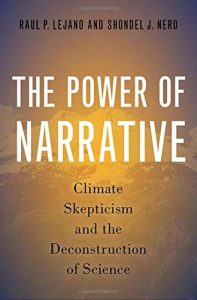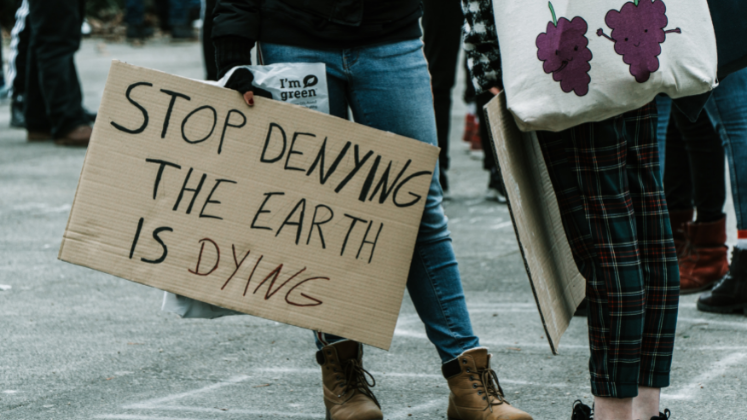In The Power of Narrative: Climate Skepticism and the Deconstruction of Science, Raul P. Lejano and Shondel J. Nero offer a narrative analysis of climate skepticism, exploring its emergence and transformations as well as its position in the ‘post-truth’ era. This book will help readers to critically understand the social and political construction of public narratives surrounding climate change as well as other contemporary issues, writes Sneha Biswas.
The Power of Narrative: Climate Skepticism and the Deconstruction of Science. Raul P. Lejano and Shondel J. Nero. Oxford University Press. 2021.
 Find this book (affiliate link):
Find this book (affiliate link): ![]()
A typical day in our lives involves several narratives. As Jerome Bruner states, ‘Narrative imitates life, life imitates narrative’. Narratives, which are basically stories, stimulate emotions and form and bind communities. Narratives maintain the intergenerational knowledge flow among many indigenous as well as non-indigenous communities. When any debate enters into the public domain in narrative form, it takes a more convenient and comprehensive shape.
However, in their book, The Power of Narrative: Climate Skepticism and the Deconstruction of Science, Raul P. Lejano and Shondel J. Nero elaborate on the danger of a narrative being influenced by an ideology. The authors are experts in narrative analysis and linguistics: Lejano’s work focuses on the psychological and social construction of several environmental concepts and Nero’s research concerns applied linguistics and pedagogy. Their book presents a chronicle of climate skepticism: its emergence, its transformation into an ideological narrative, its present context in the ‘post-truth’ world and some future suggestions to curb the growth of ideological climate narratives.
In the book, climate skepticism refers to ‘expressing doubt over the accuracy of climate change science and/or arguing against carbon mitigation’. Skepticism towards climate change has emerged rapidly over the last two decades. According to Lejano and Nero, the global depression in 2008, the debated ‘Climategate’ and the failure of commitment at the Copenhagen climate summit in 2009 mark the beginning of climate skepticism.

Photo by Jonathan Kemper on Unsplash
The book is composed of two major segments – two chapters offer the main analysis of climate skeptic narratives in different countries: namely, the US, the UK, Germany and China. Online surveys, op-eds in newspapers and online comments are used as data for the narrative analysis. The remaining chapters concentrate on deconstructing the metanarrative of climate skepticism.
Climate skepticism was rooted in the US and started to get a stronger and louder foothold there much earlier than the other three countries. One chapter is fully dedicated to tracking and exploring the emergence of public skepticism in the US from 2001 to 2018. The authors describe the development of trend skepticism (the denial that global temperatures are rising) in the US over five stages.
Climate skepticism was marked strongly in the US as the claims of climate science were seen to threaten the ‘American way of life’. In other parts of the world, such as the UK and Germany, the authors attribute climate skepticism to concerns about the ‘cost feasibility’ of climate change policies rather than questions about scientists’ credibility. On the other hand, climate skeptics in China hold that climate change debates and all global summits are part of a ‘western plot to undermine China’ and its economic growth. This polarised stance reflects the disappointment that followed the 2009 Copenhagen climate summit.
In the remaining chapters, the authors shed light on the major components of an ideological narrative, such as autopoiesis and decontextuality. They decode the genetic metanarrative of climate skepticism – how it follows a particular structure and becomes saturated with ideology. The authors explain how this narrative helps develop a like-minded community, position it in a post-truth world and also decipher the social construction of climate science.
Through their analysis of op-eds and online comments, the authors identify some of the common strategies which are used by climate skeptics. These include calling climate change a ‘hoax’ and a global conspiracy, labelling its proponents as ‘alarmists’ and claiming climate change as political propaganda created by climate scientists. It also involves intimidating individual scientists (the Serengeti strategy), using derogating adjectives and sarcasm against climate change activists, deploying an ‘us vs them’ narrative and making reverse accusations. In the case of the US, Al Gore, the former US Vice President and Nobel Peace Prize winner, was found to be a common target of the climate skeptics for being a strong voice of climate change activism.
As readers proceed through the remaining chapters, climate skepticism as a ‘story’ is unravelled with the help of Actantial theory. According to the Actantial theory framework, each general storyline comprises of actants, a subject (usually the hero), an object, a helper and an opponent and the interactions between these. Similarly, the climate skeptic narrative also encompasses a plot, characters or actors and events with some emotive touches that make it appealing to the general public.
The main structure of climate skepticism is built on disbelief, blame, misinterpretation of scientific data and more, all of which fully characterise the essential features of the post-truth era. Another important catalyst in the development of climate skeptic debates is identified in the book as political regimes. For example, the US saw an increase in the climate skeptic community during the Donald Trump administration. The former US President is one of the strongest climate skeptics. Within the time period of November 2011 and October 2015, Trump tweeted about his climate skepticism 115 times in total. He also scrapped many of the environmental laws made during the Barack Obama era. It can be inferred that political regimes can largely influence the building of public narratives.
The book unveils how climate skepticism, or what the authors refer to as ‘the counter ego of climate science’, started as an opinion that expressed disbelief in the anthropogenic (human) causes of climate change. It took the form of a narrative denying climate scientists’ claims, spreading its roots in public forums, before entering the realm of ideology. This makes the reader realise that climate change is not about science alone; it concerns politics and ideology.
Understanding the social and political construction of narratives not only helps readers understand this particular topic, but it can also act as a guide to other contemporary issues such as rising populism in democracies around the world. Even during the COVID-19 pandemic, skeptics can be found all around. They label the pandemic as a ‘hoax’, as political propaganda to exhibit power or as a ploy made up by the pharmaceutical companies. Hence, the book’s appeal is not limited to an academic audience but is also for those in the general public who want to be aware of the construction of current debates.
Throughout their analysis, the authors maintain their unbiased stance and avoid the use of absolutist terms like ‘denialists’ from the very beginning. Their inclusion of the other part of the story – the narrative of climate science, its danger of becoming an ideology and the need for climate scientists to consider how they use their authority when publicly addressing any scientific issue – provides a comprehensive understanding of narratives. The book comes with the obligation to critically analyse any surging narrative in our social-media-dominated ‘post-truth’ world. The book explicitly indicates the responsibilities of climate scientists as a community. Moreover, the book certainly poses questions regarding the important role played by the media, journalists and social media in the construction of public narratives.
In their recommendations, the authors suggest the importance of choosing the right persons (local representatives) and the right language for addressing the subject of climate change. The authors’ arguments resonate with those of the climate scientist Michael Mann, who opines that demonising individuals (climate skeptics in this case) will only help to delay taking action. Instead, we need to be open-minded, sensitive and inclusive in order to build a healthy discussion around climate change. Unlike Mann’s 2021 book, this work is not about what we can do about climate change. Instead, it lays the paving stone for approaching the construction of the whole climate change debate while putting on our critical lenses.
Note: This review gives the views of the author, and not the position of the LSE Review of Books blog, or of the London School of Economics and Political Science. The LSE RB blog may receive a small commission if you choose to make a purchase through the above Amazon affiliate link. This is entirely independent of the coverage of the book on LSE Review of Books.







